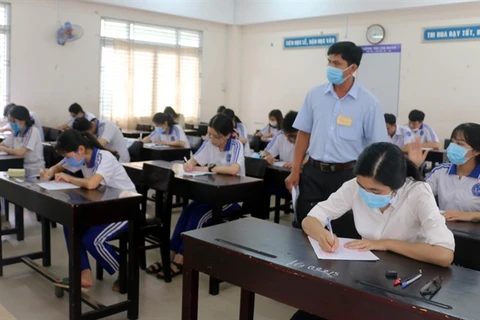 More and more universities have priortised or enrolled students who have international foreign language certificates. (Photo: VietnamPlus)
More and more universities have priortised or enrolled students who have international foreign language certificates. (Photo: VietnamPlus) Hanoi (VNA) – University leaders have suggested students spend more time learning foreign languages to get good jobs after graduation.
Foreign language certificate - a criterion in enrolment
More and more universities have priortised or enrolled students who have international foreign language certificates, especially English, for the 2021-2022 academic year.
The universities, both public and private, have set English as an admission criterion.
Universities in the public security sector, for example, will for the first time admit new students based on their high school performance and English competency. Accordingly, applicants eligible for the universities’ enrolment plans must have IELTS Academic or TOEFL iBT or HSK certificates.
The Hanoi Medical University said it will also include English as one of the criteria in its enrolment, said Le Dinh Tung, head of the training management department at the university, adding that 40 students (10 percent) would be admitted to the university according to this criterion.
Other higher education institutions like the Academy of Finance, the Foreign Trade University, the Hanoi University of Science and Technology, the University of Water Resources, and the Phenikaa University have also followed the suit.
More investments in foreign languages
Some said the English language requirements set by universities would hinder rural students and create inequality in enrollment.
However, university leaders that students admitted under the criterion make up a small number. Moreover, the requirements will promote foreign language learning and teaching.
Professor Nguyen Van Hieu, deputy head of the Phenikaa University, said the university sets aside only 25 percent of its enrolment quotas for students with foreign language certificates.
Echoing Hieu’s views, Nguyen Xuan Thach, head of the training management department at the Academy of Finance, stressed the significance of English language certificates.
However, he said, the students who are unable to pursue the certificates would uphold their strength in other subjects.
Dr. Tran Khac Thac, deputy head of the training department at the University of Water Resources, suggested universities raise standards for IELTS scores during the enrollment.
Students should equip themselves with foreign languages as the ASEAN labour market is opening up, he said.
In Vietnam, English is a compulsory subject from 3rd grade onwards. Students in public schools are mostly taught using the traditional methods of grammar exercises and vocabulary cramming. In major cities like Hanoi and Ho Chi Minh City, many parents send their children to English centres at an early age.
Vietnam’s EF English Proficiency Index (EPI) average score was 473 out of 800 in the marking for 2020, making it the second year in a row Vietnam has been listed in the low-proficiency category, according to "the world's largest ranking of countries and regions by English skills" released by Swiss Education First (EF), a global language training company.
The ranking was based on surveys conducted in the form of an online quiz with the participation of nearly 2.2 million adults from 100 non-native English speaking countries and territories.
For the first time, the points scale has been moved to 800 this year, equivalent to English level C2, the sixth and final level in the Common European Framework of Reference (CEFR).
A report on the ranking explained a low proficiency level as an individual only being able to "navigate an English-speaking country as a tourist, engage in small talk with colleagues, and understand simple emails from colleagues."
In Asia, Vietnam was ranked 13th among 24 economies, down from 10th last year, and 65th globally. The three nations with the highest ranks in Asia, Singapore (10th), the Philippines (27th) and Malaysia (30th) were listed in the "very high proficiency," "high proficiency" and "moderate proficiency" categories.
In Southeast Asia, Vietnam's English skills were higher than Indonesia (74th), Cambodia (84th), Thailand (89th), and Myanmar (93rd).
Though there was a slight drop in the ranking, the overall English ability of Vietnamese has remained stable over the years, according to experts./.
























